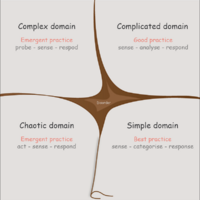The Cynefin Framework
From apppm
(Difference between revisions)
LasseMadsen (Talk | contribs) |
LasseMadsen (Talk | contribs) |
||
| Line 1: | Line 1: | ||
| − | [[File: | + | [[File:Cynefin_as_of_1st_June_2014.png|200px|thumb|right|The Cynefin Framework]] |
This article will introduce the Cynefin framework and its underlying practices, which can be used for sense- and decision making in a complex and complicated world. The framework is developed by David J. Snowden (born 1 April 1954), and is used by leaders to determine operative context so they can make appropriate choices. | This article will introduce the Cynefin framework and its underlying practices, which can be used for sense- and decision making in a complex and complicated world. The framework is developed by David J. Snowden (born 1 April 1954), and is used by leaders to determine operative context so they can make appropriate choices. | ||
Revision as of 23:47, 13 November 2014
This article will introduce the Cynefin framework and its underlying practices, which can be used for sense- and decision making in a complex and complicated world. The framework is developed by David J. Snowden (born 1 April 1954), and is used by leaders to determine operative context so they can make appropriate choices. The Cynefin framework splits the issues that faces leaders into five contexts; simple, complicated, complex, chaotic and disorder. Each of which requires different approaches to leadership style.
Contents |
History
The Cynefin model
- Simple contexts (known knowns)
- Complicated contexts (known unknowns)
- Complex contexts (unknown unknowns)
- Chaotic contexts (unknowable unknowns)
- Disorder (not determined)
Examples of contexts
- Examples of simple contexts
- Examples of complicated contexts
- Examples of Complex contexts
- Examples of Chaotic contexts
- Examples of Disorder
